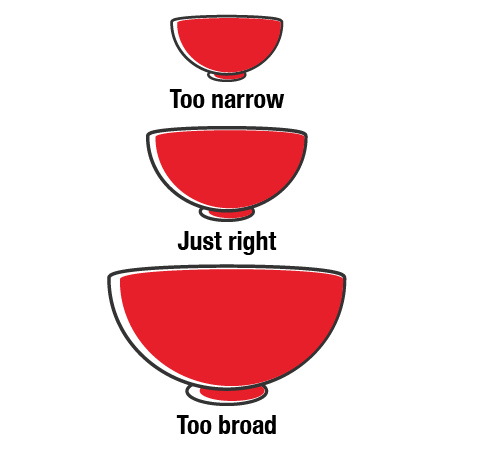Choosing a topic and researching
For some literature review assignments, you will be given a topic to explore. For others, you will need to find your own topic. Keep reading to find out how to select a topic to research that will help you meet the requirements of your assignment and how to gather the information you need.
Too broad? Too narrow? Just right?

A topic that is too broad makes it difficult to cover all important literature within your assignment's scope, while a topic that is too narrow may not provide enough relevant information.
Striking the right balance is key. You can achieve this by adjusting limiting words and phrases in your topic, such as:
- categories: solar/wind/coal energy, casual/permanent/contract employment
- time period: in the last five years, in 2024, since January
- demographic: people living in the south-eastern suburbs, women aged from 24-36, children under 5, retirees, first-home buyers
- geographical location: Melbourne, the southern hemisphere, Latin America
- organisations or industries: multinational companies, the film industry, Australian universities
Too broad
Giani is studying architecture and has been asked to write a 2,000-word literature review. She has decided she would like to explore the topic of "conservation strategies in sustainable architecture".
After doing a little research on her topic, Giani shows her topic to her teacher for feedback. Her teacher suggests that it is "too broad" and recommends that she "narrows" it.
Giani has now refined her topic and has decided to focus on a few specific aspects of sustainability in event management. This leaves her with:
Screen reader users, this text uses visual highlights to indicate different features of the text. Each highlight is explained for your convenience.
Evaluating water conservation1Screen reader users, this is a category. techniques used in Australian2Screen reader users, this is a geographical location. housing developments1Screen reader users, this is a category. since 20173Screen reader users, this is a time period..
Similarly, some literature review topics may be too narrow and it may be difficult to find enough information for your assignment. In these cases, it may be necessary to remove limiting words and phrases to make the topic more broad.
Too narrow
Edmond has chosen the following topic for their literature review:
The mental health impacts of excessive gaming on Discord on male Australian students from 13-15 years of age.After doing a search for information, Edmond was unable to find many relevant articles or studies. They contacted their teacher, who suggested that they make their topic broader.
After revising their topic, Edmond settled on:
The mental health impacts of excessive online gaming on Australian high school students.The topic has been made broader by:
- removing the specific gaming platform
- removing the gender focus
- broadening the demographic from 13-15 to all high school students
Brainstorming
Once you have a good idea of your topic, it's time to do some brainstorming about what potential subtopics you would like to cover.
Think about what you already know about the topic and information that's been covered in your course.
It's a good idea to use a mindmap so that you can make a visual plan that shows how topics relate to each other.
Researching your topic
Now, start your search for the information that will be included in your literature review. You can start by doing some basic background reading and familiarising yourself with the core concepts or principles in the area.
After that, it's time to do a more in-depth search. Visit the Find information section for some great tips for how to do this.
How much time should I spend researching?
Judging how much information and how many sources to include in your literature review can be challenging. A common trap is spending excessive time searching for information, which can reduce the time available for writing and result in gathering more information than can be included in your assignment.
To avoid this, consider these practical tips:
- Set a research deadline, such as a few days or a week, and stick to it.
- Let the word count guide you. For instance, you don't need to cite 50 authors for a 1,500-word literature review.
Evaluating information
The quality of your sources is more important than the quantity. Your literature review should focus on the most relevant theories and studies in your field. Including unreliable or outdated information won't impress your marker.
Consider these factors:
- Currency: When was the information published or updated? Is it current?
- Relevance: Is it significant in your area of study and relevant to your topic?
- Authority: Who is the author—are they an expert? Do they have affiliations that suggest bias?
- Accuracy: Is the information supported by reliable evidence and verifiable by other sources? Has it been peer-reviewed?
- Purpose: Does the information aim to inform, sell, entertain, or persuade? How does this impact its reliability, and can you identify any biases?
Learn more on the Choose valid sources page.


